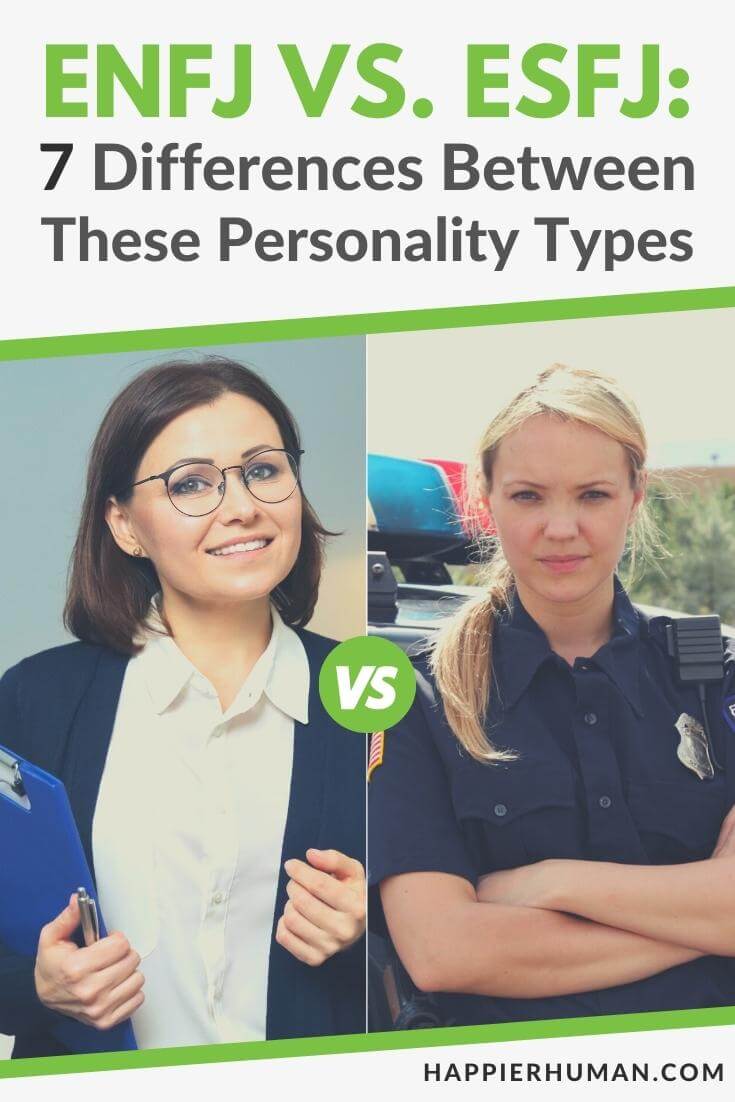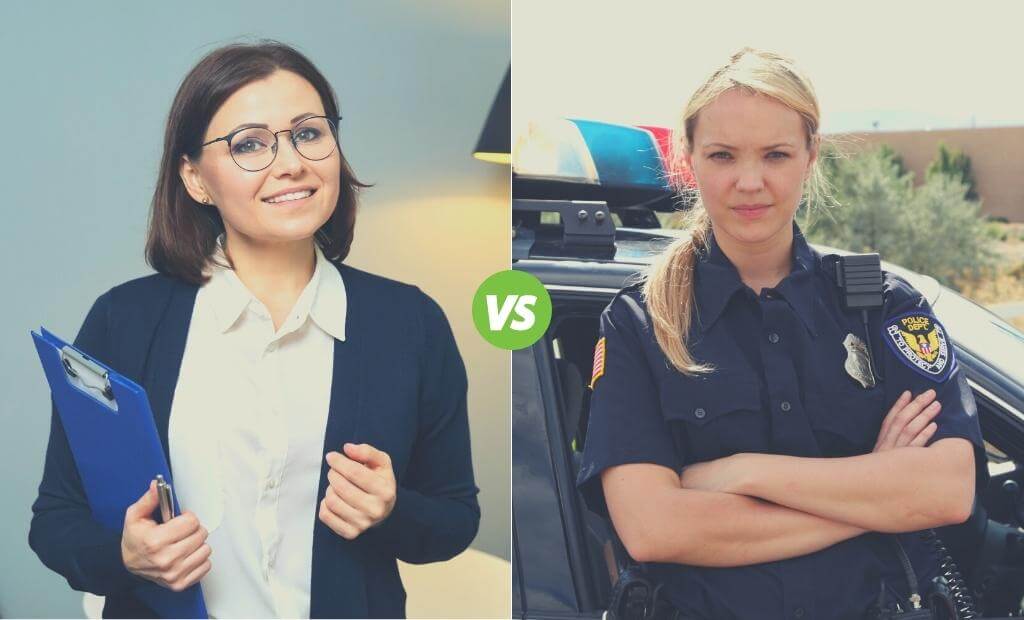There might be affiliate links on this page, which means we get a small commission of anything you buy. As an Amazon Associate we earn from qualifying purchases. Please do your own research before making any online purchase.
Of all Myers-Briggs 16 personality types, ENFJ and ESFJ are most commonly mistyped. They’re extroverted altruists who love to focus on their communities. Their differences are seemingly minor but revolve around intuition and sensing, so discussing them is relevant.
In some ways, we can view ENFJ vs. ESFJ as “giver” vs. “caregiver,” which sounds similar yet requires nuanced thinking. We’re exploring these differences further and highlighting those that will help you see these two personality types a little clearer.
What Is the ENFJ Personality Type?
If you’re wondering what ENFJ stands for, here’s a complete breakdown.
Perhaps you know an ENFJ, or you’ve taken the test and yielded such results. So, what does that mean? Many ENFJs feel called to serve. They have a lot of idealism and are generally considered very thoughtful and generous.
One of the main driving forces in their life is positively impacting the world and their communities. This type has a strong sense of right and wrong and always wants to do the right thing.
Therefore, it’s not unusual to find ENFJs in roles of teachers, coaches, community leaders, and motivational speakers.
People like Barack Obama, Maya Angelou, Malala Yousafzai, and even fictional characters like Daenerys Targaryen from Game of Thrones are ENFJs.
Some of ENFJ’s notable weaknesses include being condescending, too intense, and unrealistic.
What Is the ESFJ Personality Type?
One of the ESFJ’s most defining qualities is hospitality. This personality type is warm, loyal, and dutiful and often serves as the bedrock for their family or community.
ESFJ stands for:
The ESFJs are called “consuls” or “providers” as they are very concerned with helping and advising others. For them, life only makes sense when shared with others, and they enjoy opening their homes to family, friends, and neighbors.
Of course, they’re not saints and tend to lean towards black-and-white thinking. Nevertheless, you’ll likely recognize an ESFJ by their excellent manners and willingness to take on responsibility.
They don’t dwell on weighing the pros and cons of a situation, as they are often sure about the correct answer. Their weaknesses are inflexibility, neediness, and obsession with status.
What Do ENFJ and ESFJ Personalities Have in Common?
Before diving deep into the ENFJ vs. ESFJ discussion, let’s go over some of the main similarities between the two types.
Because they’re both extroverted, the ENFJ and ESFJ have impressive social skills and possess the ability to network.
Furthermore, they don’t fear getting out of their comfort zone and feel energized by other people. Both types can show compassion for others and strive to make a difference in their surroundings. But they also love feeling valued and love planning activities.

Also, they’re sensitive about being perceived negatively, and others will judge them. Overly focusing on these feelings can lead to a chronic lack of confidence.
Finally, neither type enjoys spending too much time alone. When forced to isolate, they’ll likely experience increased feelings of stress and anxiety.
7 Key Differences Between ENFJ and ESFJ Personalities
The ENFJ vs. ESFJ comparison is mostly about discovering how these personalities use their strengths to help others. But it’s also about the most common pitfalls they encounter and mistakes they tend to make. Here are the most notable differences between ENFJ and ESFJ personality types.
1. Rarity
The ENFJ personality type is one of the rarest of the 16. They make up around 2.5% of the general population, and it’s a little more likely that a woman is an ENFJ than a man.
On the other hand, ESFJs make up about 10-12% of the population, so you might even know (or you are!) an ESFJ type.
2. ENFJ vs. ESFJ as Children
Because they’re sometimes difficult to differentiate, looking at childhood for differences can help. For example, the ENFJ child typically has many friends and loves different kinds of activities.
They’re incredibly curious and strongly need to help others feel included. Parents and relatives may notice that ENFJ children love setting goals and working towards achievement. Harsh criticism does more harm than good, so correcting them gently is a better approach.
The ESFJ kids are also friendly but often focus more on their family than their social circle. These children look to the adults in their lives for constant reassurance and love doing family activities.
Furthermore, they may display extreme empathy and go out of their way to “fix things” when someone is sad or not feeling well.
3. Love and Relationships
One could say that both ENFJ and ESFJ are “preoccupied” with their feelings. Indeed, they are loyal and care about meeting other people’s needs. However, there are some differences in their approach. The ENFJs are insightful and have an easy time connecting with people.
Also, they are future-oriented and enjoy planning their lives and including others. It’s not unusual for the ENFJ to have a precise vision of how they want their romances to unfold. After a romantic relationship ends, the ENJF might rush to shrug off their feelings and deny their pain.
An average ENFJ sees focusing on others as the most important endeavor, which means they can sometimes feel “spent.”
The ESFJs value emotions but in a somewhat more pragmatic way. They’re the person with the plan on how to make everything better. Unlike ENFJs, they prefer to dwell on the past, not envision the future.
An ESFJ you know loves to reminisce of “old times” and spend hours processing an event with their friends. In terms of romantic relationships, the ESFJ may feel insecure due to previous negative experiences, so work in this area can be helpful.
Post-breakup, the ESFJ might be reluctant to move on quickly and will need time to process their feelings.
4. Workplace and Career
Engaging in the ENFJ vs. ESF debate is helpful because it can sometimes tell the ideal careers for each type. However, it can also tell us how they typically act in a workplace and if there’s room for improvement.
For the ENFJ type, pursuing a career is essential, though they tend to choose jobs that make them feel very useful. This type often becomes a lawyer, author, editor, social worker, coach, or fitness trainer.
They should avoid career paths that include military, engineering, carpentry, or system analysis. In a workplace, you can expect ENFJs to work hard, stay positive, and help others when necessary.
Indeed, they are reliable, but they might underperform when a task feels somewhat exciting.
The ESFJs have superb interpersonal skills and put them to good use at work, no matter what they do. However, when choosing their career, the ESFJs will likely do best with professions such as counselor, police officer, caterer, child care provider, special education teacher, or hotel manager.
They might want to avoid careers are dentists, dietitians, event coordinators, or HR managers. The ESFJ type appreciates structure and organization and feels motivated in an action-oriented team.
5. Dealing With Change
We’ve already mentioned that ENFJs love thinking about the future, whereas ESFJs enjoy recalling the past. But how does this difference reflect how they deal with change, which is one of life’s inevitabilities?
Because ENFJs draw inspiration from planning and dreaming about the future, they are more receptive to change. They quickly get over-familiar routines and repetitive formulas and welcome something new.
On the other hand, the ESFJ requires stability, and every potential change automatically causes some discomfort. When they are in an unfamiliar environment, the ESFJ confidence may struggle.
However, they will quickly focus on finding new routines and building communities. The ESFJs need a home “base” or a space where they can demonstrate their best qualities.
6. Communication Styles
How do you tell ENFJ and ESFJ apart? First, try paying attention to how they communicate. The average ENFJ loves using metaphors and coming up with elaborate analogies.

This can be incredibly entertaining but also confuses those who prefer direct talk. When they want to drive home a point, an ENFJ type will rely on symbolism, start with the big picture, and then work towards the specifics.
The ESFJ is the exact opposite. They see words as tools to reach out and connect with people, so they keep everything direct and straightforward. They use literal language and describe events and people without unnecessary additions.
7. Conflict Resolution
Some people avoid conflicts as much as possible, while others confidently walk toward them. Neither ENFJ nor ESFJ are prone to conflict, but they don’t shy away from it either.
However, their differences are most notable in what they choose to argue for and their conflict strategies.
The ENFJ personality type is the first to speak out against injustice and advocate for others. When in conflict, the ENFJs are articulate, persuasive, and tenacious, especially if they genuinely believe in something.
Sometimes, they take on a fight that can weigh them down, and they become overwhelmed. When that happens, they will likely complain about not being appreciated.
The caregiving ESFJs are more about diffusing conflict and working towards a harmonious outcome. This tendency doesn’t come from delusion but from their down-to-earth nature and feelings of personal responsibility.
A well-meaning ESFJ type will use common sense and facts and focus on the positive to reach the desired result.
Final Thoughts on the ENFJ and ESFJ Personality Types
The ENFJ vs. ESFJ overview yields a few critical conclusions. First, both personality types are altruistic and want to do everything they can to help others.
But while ENFJ enjoys planning the future and does well with change, the ESFJ needs stability and strong roots in their community.
They’re both reliable and hardworking. However, the ENFJ needs a little excitement in their work, and the ESFJ loves structure and organization.
These compassionate extroverts are great friends and thrive in long-term relationships, though they handle breakups differently.
If you want to learn more about the 16 personality types, check out this article.
Finally, if you want to identify YOUR personality type, then take one of these 11 personality tests to better understand what makes you tick.


